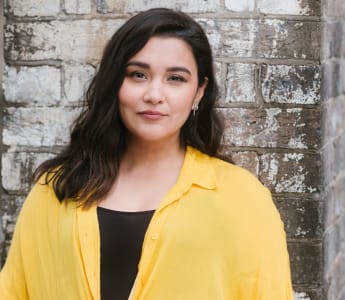
Saman Shad is a writer, journalist and teller of stories. Her writing credits span mediums, including radio scriptwriting for the BBC in the UK and the ABC in Australia, and playwriting, with works commissioned by theatres in London and Sydney. She is a regular writer for several publications, including The Guardian, Sydney Morning Herald and SBS. She has also worked on screen projects including The Disposables currently showing on ABC Me. Her debut novel, The Matchmaker, is out now, published through Penguin Australia.
Ahead of her workshop on Writing Romance, Saman answered some questions posed by our Program Admin Officer: Competitions, Jennifer Nguyen, all about inspiration, tropes and the romance genre.
We’re so excited to have you running the ‘Writing Romance’ workshop at Writers Victoria. What’s your most favourite thing about the romance genre?
My favourite thing about the romance genre is that, most of all, it’s fun. As a writer it’s fun to write and hopefully for book lovers romance is a genre that is fun to read. It’s also a genre that, for me at least, offers a bit of light in a time when so much seems dark. I also appreciated being able to include a lot of themes and issues that were important to me into my book – so it’s important to note, just because you’re reading romance doesn’t mean that there aren’t deeper topics involved.
In The Matchmaker, Saima (your protagonist) is an unconventional matchmaker in the Desi community, matching couples religion based on personality, future-goals, etc. rather than typical things like career, class, which causes quite a stir. While writing the character did you discover anything unconventional, whether writing-related, life-related or romance-related?
When I started writing this book, I thought because it was a romance it would be easy to write but actually it was anything but. It was quite tricky to get the balance right – of the lightness along with the deeper themes I wanted to explore. Working on that balance took time and I spent a long time editing this book. We wanted to keep the focus on Saima and Kal (the protagonists) and the fact that this is ultimately a love story, but also include elements of what it’s like being a second generation immigrant in this country and the many things that go with it along with mental health, cultural traditions that are no longer relevant and intergenerational trauma. These sound like heavy things but ultimately I think we managed to get the balance of including these elements along with keeping it a love story.
Did you have any media inspiration (novels, TV shows, movies or something else) for The Matchmaker?
It was interesting for me to see how arranged matchmaking has managed to come into the zeitgeist through shows like Indian Matchmaking, the movie What’s love got to do with it? And even shows like MAFS which is ultimately about arranged marriages. But, for me, I wanted to go deeper with my book about how does arranged marriage, which is a tradition that has been practiced for centuries, work in this day and age, especially with second generation immigrants. How is it changing and what parts of the tradition are we losing? So, ultimately, I’m not sure I’d say I was inspired by the sort of shows I saw in the media but it did produce a spark in me that I wanted to demonstrate the reality of what it’s like and also banish a lot of the stereotypes attached to the concept.
What’s your opinion on tropes? Is it essential to stick to a trope’s formula in the romance genre or do you prefer to see them subverted? What are your favourite romance tropes? And what tropes do you like a little less?
Tropes definitely have a place in romance and in many ways if you’re writing a romance, tropes help structure your work. Also, romance readers have an expectation that they will be seeing tropes when they pick up a romcom. I quite enjoy the meet-cute for example, I use it in my book and I also played around with enemies-to-lovers trope. At the same time I think when you’re writing a romance novel you can’t get too hung up on tropes themselves. For me it was good to know the tropes that exist in romance, but I wasn’t led by them. I also enjoyed subverting a few of the tropes and as a reader I always enjoy when writers do that. But tropes exist for a reason and it’s always good to see when they’re used in a clever way.
If you could make a playlist for The Matchmaker what songs would be on it?
Funny you mention that. I have created a playlist for The Matchmaker on Spotify so check it out if you can by clicking this link.
What are your favourite romance reads? And, for those starting their romance writing journey, what book would you consider a masterclass in romance writing?
I’ve enjoyed reading Helen Hoang’s work. Her debut The Kiss Quotient was a great read and I enjoyed how she made the romance genre more relevant by making her protagonist culturally diverse (she also has Asperger’s) and there’s a fake relationship trope at the heart of it all. I also enjoyed reading Queenie by Candice Carty-Williams about a 25-year-old Jamaican British woman living in London, straddling two cultures and trying not to make her life a mess! It was fun and funny. I’m not sure there’s a book I’d consider a masterclass in romance writing, though perhaps Pride and Prejudice comes close!
Places are still available for Saman’s workshop Writing Romance. Members of Writers Victoria receive up to 37% off the full price of all clinics, workshops, seminars and courses. Writers experiencing financial and social barriers to developing their skills are encouraged to apply to The Writers Victoria Fund for subsidised attendance at workshops and clinics.
